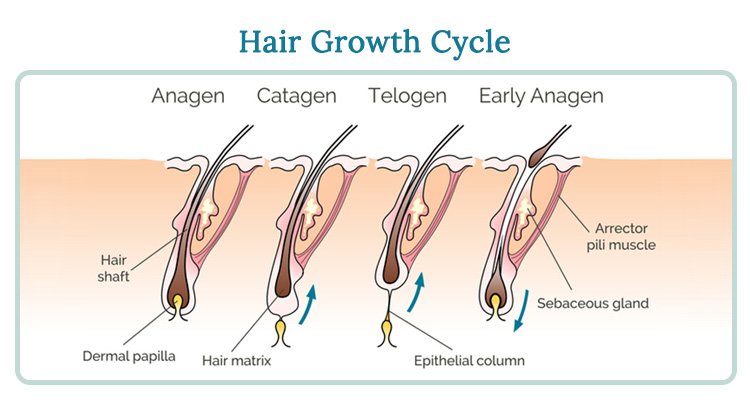Authored by Dr. Sarika Arora, MD
Is chronic stress making your hair fall out? Here’s how to tell — and how to get your hair growing again.
How stress disrupts hair growth
Hair normally grows in a healthy cyclical pattern with hair follicles cycling through four distinct phases:
1. Active growth — or anagen
2. Transition — or catagen
3. Resting — or telogen
4. Returning growth — or mesanagen

When you’re under a great deal of stress, this normal pattern of hair growth may become disrupted. Stress can block active growth and force more follicles to remain in the resting phase. Hair becomes weak and thin, eventually breaking off. An imbalance in the hair growth cycle isn’t hard to miss: you see much more hair on your hairbrush and thinning hair on the scalp. When a large group of follicles all turn off in one place, bald spots may appear. Most of the time this occurs slowly, but in some cases it can happen all at once, causing a clump of hair to fall out.
The negative effects of stress on hair growth have long been known. The process by which stress influences hair loss, however, has remained a mystery — until now.
What’s at the root of stress-related hair loss?
The culprit is cortisol, the body’s main stress hormone. When too much cortisol is produced by the adrenal glands, as it can be when the body is in a state of chronic stress, the dysregulated hormone is powerful enough to disrupt cell signaling in hair follicles.
This happens, some researchers say, because high cortisol levels trigger an excess of pro-inflammatory cytokines, and it’s these cytokine molecules that prevent the hair growth cycle from moving from the telogen/resting phase to the anagen/growth phase. Cytokines may also disrupt follicular melanocytes, the part of the follicle that produces hair pigment, helping to explain why stress seems to hasten the appearance of gray hair.
In one recent study on mice, researchers pinpointed signaling receptors on hair-follicle stem cells that are influenced by cortisol. Researchers observed that when mice had low levels of corticosterone, the animal version of the stress hormone cortisol, hair/coat growth was abundant. In mice with high levels of corticosterone, hair growth stopped and shedding increased.
Returning to a healthy hair cycle
The good news about stress and hair loss? The effects can be temporary and healthy hair growth can be restored.
However, you need to know that protecting hair from the ravages of stress has very little to do with what shampoo you use or expensive hair treatments. The secret to your hair looking thick and lustrous again starts with reducing stress and returning cortisol production to its natural balance.
These steps can help…
Breathe
Deep breathing is a simple technique for stress reduction that can be used anywhere. Similar to other mindfulness-based practices, controlled breathing helps to stimulate the parasympathetic nervous system, known as the “rest and digest” system, which helps to lower cortisol levels.
Eat well and often
Since hunger naturally signals your adrenal glands to release more cortisol, don’t skip meals or let yourself go too long without eating. Following an adrenal fatigue diet — eating certain foods at specific times of the day — can help your body recover its natural cortisol rhythm. Avoid the “crash and burn” that follows eating sugar, white flour and caffeine. This spikes cortisol, only making problems worse.
Supplements for cortisol balance and adrenal function
Adrenals need a steady supply of B complex vitamins and Vitamin C for optimal function, including cortisol regulation. These vitamins are also great for your hair! Look for a quality multivitamin supplement to fill nutritional gaps. For deep adrenal repair and support, feed your adrenals adaptogenic herbs such as rhodiola and astragulus.
Modify your exercise routine if you feel drained by it
Exercise can help hair grow because it increases blood flow and circulation throughout the body. For many women, exercise is a stress reliever. If this is you, stick with it. However, others can feel exhausted by exercise when they are under stress. Listen to your body. If aerobic exercise leaves you feeling keyed up or extremely tired, try relaxing walks, yoga or any kind of exercise that recharges you rather than drains you.
Don’t overlook your thyroid
Low thyroid is another main culprit in thinning, brittle hair. Your adrenal and thyroid glands are highly interconnected parts of your endocrine system. Stress alone will not cause a thyroid disorder, but a stress imbalance in the adrenals can make any imbalance of the thyroid worse. Your hair loss could be a sign of low thyroid, or a sign that you are battling both adrenal and thyroid issues. Are you struggling with hair loss and other symptoms like brittle fingernails, weight gain and fatigue?
Taking the time to reverse stress-related hair loss comes with another big bonus: not only will your hair look better, but you’ll feel better too.














